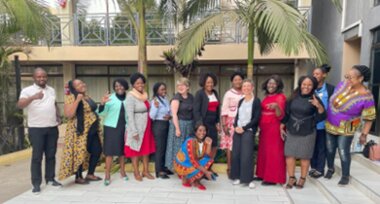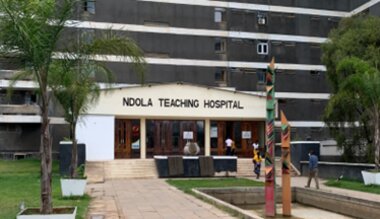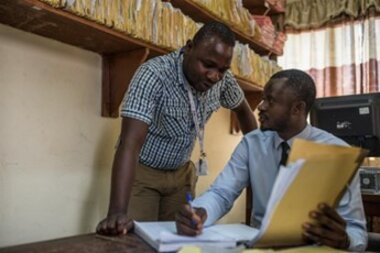19 October 2022
King’s Global Health Partnerships (KGHP), a King’s Health Partners initiative, has more than 20 years’ experience in bringing about meaningful change and mutual benefit for partners in Sierra Leone, Zambia, the Democratic Republic of Congo and Somaliland, and the UK’s National Health Service.
With a range of volunteering opportunities available for clinicians and non-clinicians in the four partnerships, KGHP works as a peer alongside local health partners in each country and is committed to supporting health-system strengthening activities for the long-term.
Laura Semple, Director of National Programmes, The AHSN Network, and one of KGHP’s committed volunteers since 2016, reflects below on what volunteering has meant to her over the years, and the invaluable lessons she has taken back to her work in the NHS.
It was KGHP’s values that attracted me to the organisation in 2016, when I undertook a 6-month placement at Connaught Hospital, Sierra Leone’s tertiary centre in the capital, Freetown. I helped the heath records team design and implement a new system of patient folders with unique identifiers.
The system is still functioning well today and Connaught’s medical records team continues to improve it. The data available is now used in ongoing quality improvement and research projects. All I really did was make some suggestions for how we could approach designing the system, drawing on my experience as an NHS hospital service manager, and they did the rest, backed by practical and moral support from me.
The experience was immensely rewarding for me personally. It boosted my confidence in my own skills and judgement, as I found myself having to work much more autonomously than back home in the NHS.
Working in an environment where equipment, supplies and staff were often in short supply increased my appreciation for the comparatively abundant resources we have in the NHS and made me even more determined to make very best use of everything we have.
In turn this has led me to think more creatively about problems and challenge unhelpful bureaucracy whenever I meet it. The experience sharpened both my sense of what really matters in healthcare, as well as my self-confidence in advocating for it.
Applying Freetown experience back in the NHS
The cultural diversity of London has always brought me joy and energy, and my time in Freetown prompted me to reflect on how people in the West African diaspora community experience the NHS. The NHS Race and Health Observatory highlighted in its 2021 report, Ethnic health inequalities and the NHS, that “people from Black and minority ethnic groups experience inequalities in health outcomes as well as inequalities in access to and experience of health services compared to White groups.”
For me it is a matter of real personal regret and shame that I did not make more of an effort to understand this sooner in my NHS work and work with people to do something about it.
When I returned from Freetown to my NHS work, I brought a new understanding of the importance of culturally-competent communication to my work in diabetes and cardiovascular care. When I came across the pioneering work of Dr Louise Goff and her team on the Healthy Eating and active lifestyles (HEAL-D) programme, working with African & Caribbean communities in South London, I immediately knew this was something I needed to get behind.
 Through the shared leadership of the HEAL-D team and my former team at Health Innovation Network South London, HEAL-D Online has been available across south London since the start of 2022, with plans to pilot the service elsewhere in the UK.
Through the shared leadership of the HEAL-D team and my former team at Health Innovation Network South London, HEAL-D Online has been available across south London since the start of 2022, with plans to pilot the service elsewhere in the UK.
I can honestly say that without my experience in Freetown I would not have appreciated the importance of HEAL-D to people’s health, and as a consequence might have put my energies elsewhere. This is a concrete example of how my volunteering experience has directly benefitted NHS patients, staff and the wider NHS system.
Volunteering in Zambia
I get a lot of energy from working with KGHP and continued to work part-time as NHS engagement lead with KGHP after I returned to London. I was only too happy to take the opportunity to join the Zambia partnership as a healthcare management & leadership volunteer in 2021, contributing to a three-year project to address preventable maternal and neonatal deaths in the Copperbelt province.
Through the experience of co-designing a leadership skills course with Zambian partners through a series of online meetings, I am learning a great deal about how to be effective as a long-distance volunteer, which is of course very different from my Freetown experience but equally as rewarding.
In July 2022, I travelled with my colleague, Dr Natasha Curran to Ndola to co-deliver the three-day leadership course. The course participants were 15 senior nurse-midwives who each lead a primary health clinic in the Copperbelt province. I was inspired by their ingenuity, thoughtfulness and the examples of innovations that they have implemented at their clinic s.
s.
I also benefitted from refreshing my knowledge of coaching and other leadership skills while preparing the course, which I notice I am now making much more regular use of in my daily NHS work.
During our time in Zambia we visited Ndola Teaching Hospital, Arthur Davison Children’s Hospital and Mapalo primary health clinic. At all three, I was struck by the abundance of useful and accessible data on the walls, for example referral and activity data from the last quarter, and maternal and neonatal outcome data.
Zambian colleagues place great emphasis on this, and it made me realise how much more we can do in the NHS to put useful data back into the hands of frontline teams.
 When Dr Misa Funjika and Dr Bwendo Nduna opened the course I was struck by the uniting truth in Dr Funjika’s comment that leadership is about “finding solutions where it seems impossible”, whether you’re in the NHS or Ndola or anywhere else.
When Dr Misa Funjika and Dr Bwendo Nduna opened the course I was struck by the uniting truth in Dr Funjika’s comment that leadership is about “finding solutions where it seems impossible”, whether you’re in the NHS or Ndola or anywhere else.
Being involved in global health partnership work is stimulating and energising. It is truly a “triple win”, benefitting individual health workers, health systems abroad as well as the NHS with all its current challenges. I would warmly encourage NHS colleagues to make the most of the opportunities on offer and see where the journey takes you.
King’s Global Health Partnerships recruits hundreds of volunteers from the UK’s National Health Service (NHS) and internationally, and connects them with health professionals in Somaliland, Sierra Leone, the Democratic Republic of Congo and Zambia. Want to get involved? Click here to view the latest volunteering opportunities.
Enjoyed this article? Read more on how volunteers from across KHP are helping hospitals in Zambia to improve care for mothers and their babies.





